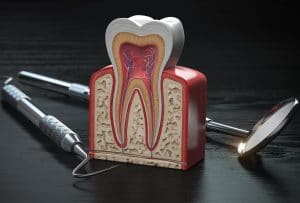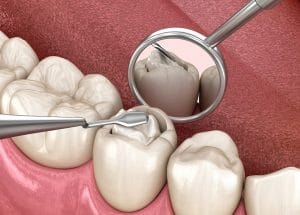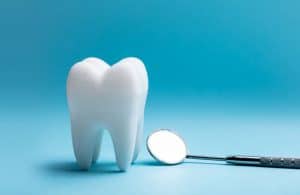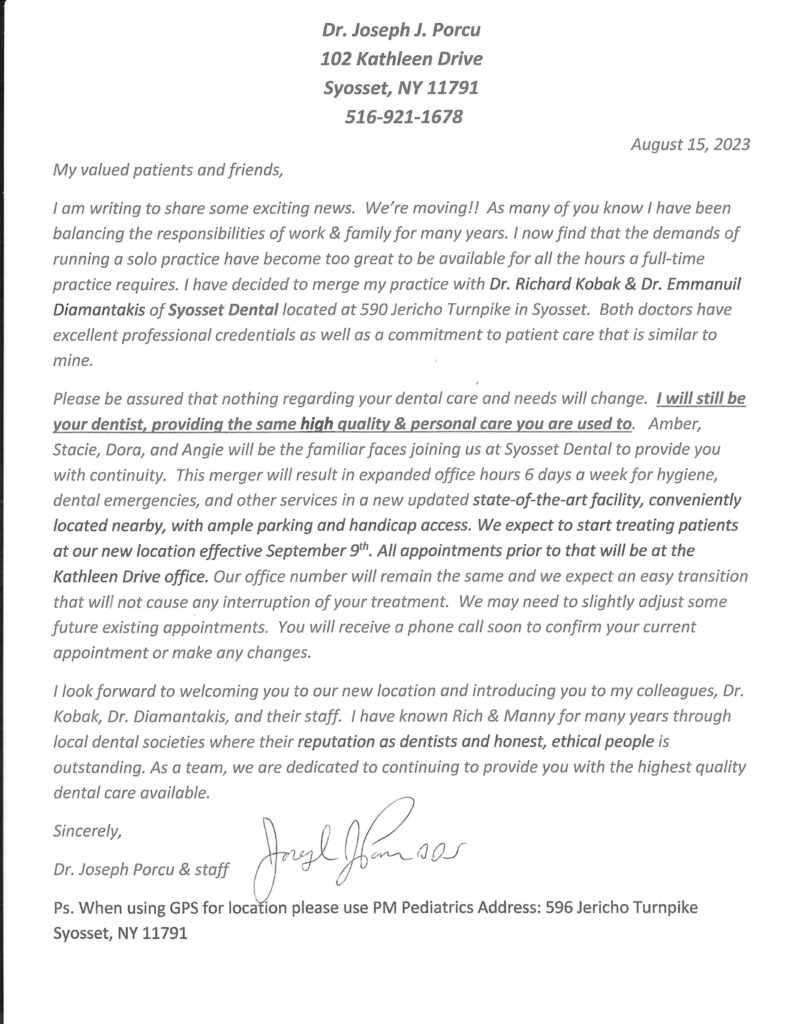 The thing about most dental health concerns is that all they need in order to get worse is time. That’s why preventing or seeking prompt treatment for any dental problem is essential to keeping your smile healthy long-term. With gum disease, however, the consequences of becoming severe over time can have implications far beyond the gum tissues that the disease mainly effects. If given enough time, gum disease can lead to serious conditions such as tooth loss, as well as increased risks to your systemic wellbeing that involve excess inflammation. (more…)
The thing about most dental health concerns is that all they need in order to get worse is time. That’s why preventing or seeking prompt treatment for any dental problem is essential to keeping your smile healthy long-term. With gum disease, however, the consequences of becoming severe over time can have implications far beyond the gum tissues that the disease mainly effects. If given enough time, gum disease can lead to serious conditions such as tooth loss, as well as increased risks to your systemic wellbeing that involve excess inflammation. (more…)
Different Ways Tooth Loss Impacts Your Oral Health
 The complicated thing about some oral health concerns is that the specific threats they pose aren’t always immediately obvious, or even noticeable. For example, when you develop gum disease, the condition mainly affects your gum tissues, and symptoms mostly develop in these tissues. Yet, the consequences can affect much more of your oral health, making it the leading cause of tooth loss. Similarly, the loss of a tooth can lead to various conditions beyond the empty space in your smile, and many of the consequences don’t become noticeable until they become severe. Today, we explore several different ways in which tooth loss can impact your oral health beyond the obvious appearance of your smile, and why these consequences are important to address as soon as possible. (more…)
The complicated thing about some oral health concerns is that the specific threats they pose aren’t always immediately obvious, or even noticeable. For example, when you develop gum disease, the condition mainly affects your gum tissues, and symptoms mostly develop in these tissues. Yet, the consequences can affect much more of your oral health, making it the leading cause of tooth loss. Similarly, the loss of a tooth can lead to various conditions beyond the empty space in your smile, and many of the consequences don’t become noticeable until they become severe. Today, we explore several different ways in which tooth loss can impact your oral health beyond the obvious appearance of your smile, and why these consequences are important to address as soon as possible. (more…)
Why You Can Look Forward to Your Tooth Filling
 When you have a cavity, treating is as soon as possible is important for many reasons. For example, the sooner you treat it, the sooner you can relieve the toothache that it causes so you can enjoy your food and beverages comfortably again. Treating a cavity early also allows you to keep the treatment minimal, often with a biocompatible tooth-colored filling. By filling the cavity, you can look forward to preserving your tooth and avoiding the need for more extensive treatment later. (more…)
When you have a cavity, treating is as soon as possible is important for many reasons. For example, the sooner you treat it, the sooner you can relieve the toothache that it causes so you can enjoy your food and beverages comfortably again. Treating a cavity early also allows you to keep the treatment minimal, often with a biocompatible tooth-colored filling. By filling the cavity, you can look forward to preserving your tooth and avoiding the need for more extensive treatment later. (more…)
Choosing Between a Partial or Full Dental Crown
 Not too long ago, choosing a dental crown and the material that it should be made from were the biggest choices in restoring a compromised tooth. As a complete restoration that caps and protects all of your tooth’s crown structure, a traditional full dental crown can be the best solution for a wide range of concerns. Today, however, not all dental crowns are designed to completely cap teeth. By custom-designing a partial dental crown to restore only the damaged portion of your tooth, your dentist may help you regain your tooth’s health and integrity while simplifying your overall treatment. (more…)
Not too long ago, choosing a dental crown and the material that it should be made from were the biggest choices in restoring a compromised tooth. As a complete restoration that caps and protects all of your tooth’s crown structure, a traditional full dental crown can be the best solution for a wide range of concerns. Today, however, not all dental crowns are designed to completely cap teeth. By custom-designing a partial dental crown to restore only the damaged portion of your tooth, your dentist may help you regain your tooth’s health and integrity while simplifying your overall treatment. (more…)
Fixing a Tooth Conservatively with Tooth Bonding
 A tooth that’s been damaged in any way can become a serious problem for your oral health, even if the damage seems minor at first. That’s why fixing a damaged tooth as soon as possible is always the preferable way to deal with it. Yet, the goal of your treatment isn’t just to fix the damage, but also to help you preserve as much of your healthy, undamaged tooth structure as possible. With tooth bonding, fixing your tooth conservatively can be a much more efficient process, and its highly cosmetic appearance can make your tooth bonding virtually undetectable from the rest of your smile. (more…)
A tooth that’s been damaged in any way can become a serious problem for your oral health, even if the damage seems minor at first. That’s why fixing a damaged tooth as soon as possible is always the preferable way to deal with it. Yet, the goal of your treatment isn’t just to fix the damage, but also to help you preserve as much of your healthy, undamaged tooth structure as possible. With tooth bonding, fixing your tooth conservatively can be a much more efficient process, and its highly cosmetic appearance can make your tooth bonding virtually undetectable from the rest of your smile. (more…)
A Few Advantages to Treating Sleep Apnea with an Appliance
 When you have obstructive sleep apnea, or OSA, the impacts to your sleep quality and your overall quality of life can vary greatly. This is partly why knowing that you have OSA can sometimes be difficult without a professional sleep test and assessment. However, the good news for many patients with sleep apnea is that treating their condition isn’t always as complicated as detecting and diagnosing it. For many people, we can often help address sleep apnea in a comfortable and convenient manner with the help of a custom-designed sleep apnea appliance. (more…)
When you have obstructive sleep apnea, or OSA, the impacts to your sleep quality and your overall quality of life can vary greatly. This is partly why knowing that you have OSA can sometimes be difficult without a professional sleep test and assessment. However, the good news for many patients with sleep apnea is that treating their condition isn’t always as complicated as detecting and diagnosing it. For many people, we can often help address sleep apnea in a comfortable and convenient manner with the help of a custom-designed sleep apnea appliance. (more…)
Are You Negating Your Own Dental Hygiene Efforts?
 Practicing good dental hygiene every day is one of the most important factors in preserving your healthy smile for life. Yet, it isn’t all there is to protecting your teeth and smile from things that could negatively affect them later. For example, the point of good dental hygiene is largely to prevent issues from occurring by keeping your teeth clean of harmful oral bacteria each day. However, if you eat too much sugar throughout the day, or snack too often, then you might be feeding the bacteria that are present enough to make them a threat on their own. (more…)
Practicing good dental hygiene every day is one of the most important factors in preserving your healthy smile for life. Yet, it isn’t all there is to protecting your teeth and smile from things that could negatively affect them later. For example, the point of good dental hygiene is largely to prevent issues from occurring by keeping your teeth clean of harmful oral bacteria each day. However, if you eat too much sugar throughout the day, or snack too often, then you might be feeding the bacteria that are present enough to make them a threat on their own. (more…)
What It Means When a Tooth Is Compromised
 It isn’t just your teeth and smile that are unique to you alone. The things that could potentially threaten your smile and oral health can be, as well, which is why the most successful dental treatments are those that address your specific oral health concern in a highly personalized fashion. For example, a healthy, natural tooth can become compromised in many different ways. While preserving your healthy tooth structure is typically the goal of your treatment, that can mean a variety of things depending on the specific problem your tooth faces. (more…)
It isn’t just your teeth and smile that are unique to you alone. The things that could potentially threaten your smile and oral health can be, as well, which is why the most successful dental treatments are those that address your specific oral health concern in a highly personalized fashion. For example, a healthy, natural tooth can become compromised in many different ways. While preserving your healthy tooth structure is typically the goal of your treatment, that can mean a variety of things depending on the specific problem your tooth faces. (more…)
Are You a Good Candidate for Full-Mouth Rehabilitation?
 The good thing about most modern dental health treatments is that they’re designed to help you address virtually any oral health concern with optimal efficiency. If you have a cavity, your restorative treatment can include removing the decay from your tooth with enhanced precision and preserving a maximum amount of the tooth’s healthy structure. However, if you have multiple oral health concerns that affect multiple teeth, then restoring your smile can seem more complex. Today, we examine if your smile concerns make you a good candidate for full-mouth rehabilitation, and how the treatment plan can maximize your overall results. (more…)
The good thing about most modern dental health treatments is that they’re designed to help you address virtually any oral health concern with optimal efficiency. If you have a cavity, your restorative treatment can include removing the decay from your tooth with enhanced precision and preserving a maximum amount of the tooth’s healthy structure. However, if you have multiple oral health concerns that affect multiple teeth, then restoring your smile can seem more complex. Today, we examine if your smile concerns make you a good candidate for full-mouth rehabilitation, and how the treatment plan can maximize your overall results. (more…)
When Does Root Canal Treatment Become Necessary?
 Root canal treatment isn’t always the preferred option for treating tooth decay. In fact, the condition is more often addressed with a more conservative tooth filling, before root canal treatment ever becomes necessary. However, when tooth decay becomes severe, a tooth filling may not be enough to treat the infection inside of your tooth’s pulp chamber and root canal. Removing the decay and restoring the tooth could require root canal treatment, and the success of your procedure can depend on seeking treatment as soon as possible. (more…)
Root canal treatment isn’t always the preferred option for treating tooth decay. In fact, the condition is more often addressed with a more conservative tooth filling, before root canal treatment ever becomes necessary. However, when tooth decay becomes severe, a tooth filling may not be enough to treat the infection inside of your tooth’s pulp chamber and root canal. Removing the decay and restoring the tooth could require root canal treatment, and the success of your procedure can depend on seeking treatment as soon as possible. (more…)











